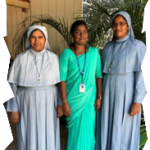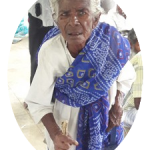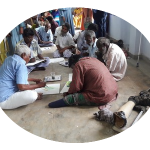Social Work
SARVODAYA NAGAR REHABILITATION VILLAGE KANYAKUMARI
No. of Beneficiaries: 145
Sarvodhaya Nagar is a rehabilitation centre which provides accommodation and rehabilitation for the families of people suffering from leprosy. Each family is accommodated in a separate house. They have electricity, water, a community hall, dispensary, gardens and space to rear goats and chicken. Occupants of these homes have registered themselves as a society. They are independent, self governing and dignified.
Need for the Sanitary Toilet Project
SMIDS has set up a leprosy colony for the neglected leprosy patients adjacent to its office at Kanyakumari. We have rehabilitated these people in this colony to provide a safe place to live. We have identified leprosy affected persons who were chased out from their families and were living on the streets, railway stations and other public places. The accommodation provided to them at the leprosy colony has helped them to have a safer place to live. The inmates of the leprosy colony are engaged in begging in the public places and managing their basic needs. Few families are living with their children in the leprosy colony. Children from these families are pursuing their studies in the nearby schools and colleges. SMIDS has assisted these families to start small income earning activities like goat rearing and chicken rearing to ensure a steady income for them.
Presently 16 families are staying in the leprosy colony and 68 inmates are there in all these families. The inmates were facing undue hardship due to poor sanitary toilet facilities. They had few sanitary toilets outside their house, which was fully damaged due to the Khaja Cyclone. The poor leprosy patients who are leading a hand to mouth existence were not able to repair or construct sanitary toilet for their families. They were facing undue hardship due to this, especially girl children and women. Due to financial problem SMIDS also was not able to support them to repair their damaged sanitary toilet or to construct new toilets. We sisters tried our level best to muster funds to construct toilets for the less privileged people but we were unsuccessful in our attempt. It was in this context only we have approached Christa Saimon for financial support to construct sanitary toilet for the leprosy colony families. We have received Euro-5000 from Ms.Christa Saimon, which helped us to construct the sanitary toilet for the leprosy families living in our leprosy colony. Given below is a short report of the fund utilization.
Construction of Sanitary Toilets
We have constructed 13 toilets for the use of the leprosy colony inmates. The construction work was entrusted to a construction firm who is very reliable. Sisters attached to SMIDS supervised the toilet construction and ensured that sanitary toilet pit and other construction work are done properly and quality building materials are utilized for the construction. For hygienic reason and easy cleaning purpose we have laid floor tiles. Proper plumbing work is done to ensure regular water supply and easy cleaning. Completed toilets look very nice and very good. Leprosy colony inmates are very happy about the new toilet which helped them to use the facility with dignity. We have utilized Euro-3,000 for the sanitary toilet construction.
Transformation of what inclusion is
Words have immense power and express emotion beyond the analytical comprehending mind of the human beings. They are invisible but their touch can galvanize any heart if used with an intention and empty when used without a purpose. Words are only what they say from the surface but can reach and go beneath Mariana Trench or above stratosphere when fused with emotion. Word play Untouchable castes in India – Dalits, as there are sub castes within that untouchable class. Truly ‘inclusion’ yet leaves out people affected by leprosy. With their deformities, they are treated as outcasts of society since biblical times. It continues still, right into the 21st century. This is prevalent in all the countries that battle with this excluded disability.
People affected by leprosy experience physical, mental and emotional disability. Scarred, they lose their identity and dignity and often lead reclusive lives. Many beg on the streets to survive, some find shelter and eke out a living. I have seen it myself during my visits to a sanatorium established in 1864 at Chinglepet, a town about 70kms south of Chennai /Madras in the state of Tamilnadu in India. I used to visit with an NGO to provide what they need and want and to talk to them and listen to their stories. I came across people who have held positions in the society to find refuge in such sanatoriums when affected by leprosy and when disowned by their families or when they themselves withdrew to self fold within and extinguish their light so they could die unsung, unwept and unseen. Such is the tragedy that is hardly visible to the society.
The disability advocacy groups don’t seem to take a note of this and it’s not clear if the exclusion of this ostracized people group – people affected by leprosy from their inclusive agenda is by conscious thought or by a thought that they don’t fall into “their class of disability” altogether. Whatever, It can be described as an act of deplorable disability.
In the current scenario “inclusion” of leprosy affected people has not translated to the intended reality and there needs to be transformative action/s to bring about the total transformation of the very idea of inclusion.
Activities:
Many of the lepers are attached by serious illnesses such as Cancer, T.B., Heart condition etc. We have to look after their treatment hospitalization and payment of bills.
Art work
- Visiting sick people in their houses and praying for them.
- Preparing them for baptism, communion etc. giving baptism when priests are not available.
- Look after the burial of the dead when needed.
- Arranging for Holy Mass during Christmas and Easter. In future weekly Masses and catechism classes will be arranged.
Rural Documentation Centre
A rural documentation centre containing reference books and materials, audio video cassettes and study reports is maintained. It helps to access information related to the target area, target people and the issues addressed.
- Formation of Federation of Women Self Help Groups.
- Extensive Life Skill Education for the Orphans and Vulnerable Children
- Vocational Rehabilitation Centre for the Disadvantaged and the Destitute
- Promotion of people’s Bank
- Establishment of a Training and Resource Centre for the vulnerable and marginalized
The focus is mostly on women and children to blossom their hidden potential
- TO PROMOTE FAMILY UNITY
- TO PROMOTE HEALTH IN THE AREA
- TO HELP IN EDUCATING THE NEEDY PEOPLE
- TO PROMOTE INCOME GENERATION
- TO PROMOTE ECONOMY
And above all counseling and advising to solve their major problem. These are different walks of life the IDT extends its help and support to the needy people
PROMOTION OF JOINT LIABILITY GROUPS (JLGS)
Joint Liability Group (JLG), the borrowers make a group among themselves and the microfinance institutions give loan to that group. One person in that group is appointed as leader of the group and each person is responsible for the loan taken by any member of the group. If any one person in the group defaults then other group members will have to pay for that. This Group concept is helpful because everyone is being monitored by other people in the group and the borrower utilizes his money properly. If anyone defaults, other group members will make all possible efforts to take money back and he will not find any place in any group next time. So, he will not be able to take loan in future. This thing motivates the borrowers to maintain discipline while asking for loan and utilizing it appropriately
SMIDS started promoting JLGs with the active support of NABARD and IFAD. We have organized JLGs on the basis of activities/trade they are engaged like people engaged in cow rearing, banana cultivation, seas shell handicrafts etc. We have formed 3350 Joint Liability Groups in our operational area and a total of 1500 members are in it. In order to equip the JLG members to start micro-enterprises skills up gradation trainings are organized for its members in different trades, which are of employment potential in the target area. SMIDS is in the process of linking JLG members with banks and other financial institutions for their economic development in the coming days.
HOME FOR THE DIFFERENTLY ABLED
There are two mentally retarded home being run so as to help in the development of mentally handicapped children. People between the age group 3 years to 25 years are accommodated. 50 children are accommodated in a batch. Apart from offering board and lodge, these homes impart skill education and help the children to utilize their potentiality and thereby to lead self sustainable lives with their own initiatives. Special trainings are offered according to their capacities. Today many of our children are found employed and self employed in and around Kerala and Tamil Nadu.
CARE FOR SENIOR CITIZENS
Changing family patterns of Joint family to Nuclear family system has contributed to vulnerable situations to many of the elders in the encircling regions of SMIDS target area. Senior citizens were traumatized by severe psycho-social problems because of ignorance of their young generation in so many ways. With the view of creating a community care and regaining the lost relationship with their young generation the home for the senior citizens are started. Four different homes have been established so far in different locations catering to the needs of disadvantaged senior people.
VOCATIONAL TRAINING
Tailoring, Garment Making Centres & Computer Centers for unemployed rural poor women
To mitigate poverty through employment generation we started training units. Each year 8220 women were trained. 27 Tailoring schools & 3 Computer Education Centers, to help youth to get adequately trained and get self employed. Many of the trained women are now running own tailoring units and others are working in tailoring centres for salary. Their socio economic conditions have improved substantially. Since they are in our working area we are still monitoring their activities.
WOMEN EMPOWERMENT PROGRAMME
With the aim of promoting welfare among our women in the society, SMIDS organized women from deprived sections into Self Help Group comprises 10 to 20 members. Today there are more than 8800 groups that spread various districts of Tamil Nadu. These members regularly meet together for savings, credit and also to discuss certain issues they face within their community. The habits of small savings and credit are imbibed on the members. Vocational skills, Entrepreneurial skills are imparted to the members and members are regularly motivated to take up income generation activities and thereby encouraged to generate steady income to their families in the state, with a total membership of 27000.
WELFARE SCHEMES
Basic amenities such as electricity, transport, social security schemes such as old age pension, widow pension, ration card, and etc needed for living a day to day life for the tribal and rural people is met by way of campaigning against government.
SOCIAL ACTION
Self help groups have become well organized governing bodies such as PLF (Panchayat level Federation) and DLF (District level Federation).
These collective bodies have pressured governments into:
- Building roads in villages
- Settling family disputes
- Providing drinking water
- Adequate street lighting
- Building community halls
- Improving education in villages


